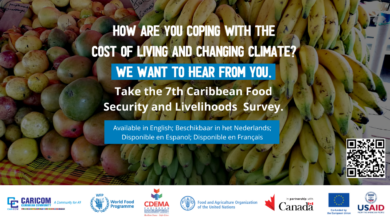The Caribbean is facing an epidemic of chronic non-communicable diseases (NCDs) such as diabetes, hypertension and cardiovascular disease1 . According to the Caribbean Food and Nutrition Institute (CFNI), unhealthy diets are a major contributor to the NCD epidemic. The agency reported that the typical Caribbean diet is characterised by an under-consumption of fruits, vegetables, whole grains, cereals and legumes, coupled with an over-consumption of imported foods which are rich in saturated fat, sugar, salt, and refined cereals. Additionally, consumers in Caribbean countries now ingest more calories per capita than needed.
Given the high prevalence of NCDs in the Caribbean, it is only fitting that this year’s theme for World Consumer Rights Day (WCRD) be “Healthy Diets”, and that the regional consumer protection community turn its attention to this issue. Indeed, healthy diets consisting of foods high in nutritional value must be the first step to remedying the problem of NCDs in the Caribbean, which has reached epidemic proportions.
Over the last decade, consumers across the world have become increasingly health conscious. Consequently, the global food industry has reacted to this trend by developing new products with health-related claims which are targeted to consumers seeking healthier lifestyles. For instance, some health claims might be that the consumption of certain foods or natural products can reduce the risk of particular diseases or health-related conditions such as diabetes or cancer. Additionally, nutrition content claims on food labels sometimes include common catchphrases such as “sugar free”, “gluten free”, or “fat free”. The problem for consumers therefore lies in distinguishing which nutrition content or health claims are indeed true, and which are false and misleading. The CARICOM Competition Commission (CCC) believes that National Consumer Protection Agencies (NCPAs) in the Caribbean Community (CARICOM) have an important role to play, in helping consumers in the region make more informed and healthier decisions with regard to the food they consume. Unlike the CCC, which has no enforcement power under the Revised Treaty of Chaguaramas (RTC), NCPAs can prohibit misleading advertising and particularly false health and nutrition content claims by food manufacturers and suppliers under their national consumer protection laws.
The CCC also believes that working in collaboration with the relevant public health authorities and standard setting bodies, NCPAs in the region are in an ideal position to recommend or promote better labelling requirements or standards, which would assist consumers in making more informed food choices. Moreover, NCPAs could recommend the verification and approval of health claims by food manufacturers from national regulatory bodies. This recommendation would include not only the verification of nutrition content claims and health claims on food labels but also health claims in advertisements. Consumer education is another important mandate of the NCPAs in CARICOM. The CCC believes that although the primary focus by NCPAs over the years has been educating consumers on their rights and obligations under national consumer laws, some attention should also be given to raising the level of public awareness in relation to the consequences of purchasing unhealthy foods, as well as the types of food marketed to children in particular. With respect to consumer education, the CCC wishes to highlight a meeting between itself and CARICOM Consumer Officials in December 2014, at which a regional Working Group on Education was established. The efforts of this Working Group will be geared towards enhancing the consumer education framework in CARICOM through the development of a regional strategy, which includes a regional consumer education message. Given the impact of the high levels of NCD’s on the health and welfare of CARICOM citizens, as a Member of the Working Group the CCC, being mindful of its mandate as outlined in the RTC, will ensure that the effects of unhealthy diets is placed high on the Working Group’s agenda when it convenes in April 2015.
For any more information about the work of the CCC and its mandate in the area of consumer protection under the RTC, please feel free to email admin@ccc.sr or view our website at www.caricomcompetitioncommission.com







